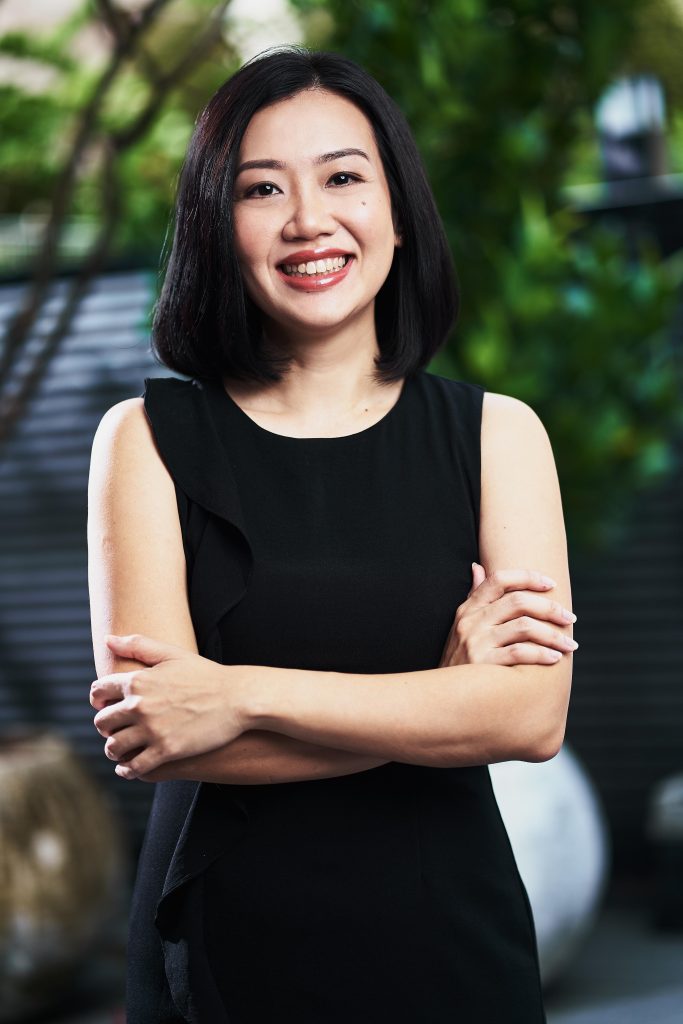She wouldn’t call herself a rebel, but Michele Lee knows a thing or two about following the heart’s call, even when it’s risky. With three companies, two daughters, and a unique leadership style, hers is an unconventional portrait of an entrepreneur.
How it all started
Imagine a world where you couldn’t find a single image of anyone who shares your skin colour, or the town you call home, or the culture that defines you. This sounds like the beginning of an unsettling dream, but the scenario is real. To this day, the visual media industry still lacks diversity. For the under-represented, finding images that represent who you are can be a needle-in-a-haystack situation.
Having spent nearly twenty years co-helming a Singapore-based integrated creative agency, Michele has experienced this problem firsthand.
After many nights spent searching for good-quality images of Asians that look natural and realistic, she (and her partner and PIXERF founder Sa’at Ismail) saw a clear gap in the market for visual content that represents the Asia they know in all its diverse and complex facets.
Soon, an idea emerged: why not build a digital platform that caters to this vision? As they envisioned it, the platform would encompass photography, videos and visual artworks, including stock and commissioned works.
Being pragmatic, she knew a start-up with a unique premise that couldn’t be condensed into “Uber for –” wouldn’t be an easy sell with the venture capital crowd, where familiar formulas often win the day. Still, the enormity of the challenge took her by surprise.

Being a woman in a man’s world
Her first challenge: getting people to understand what PIXERF is. “I spent a lot of time pitching to people who may not understand where we’re coming from and the problem we’re trying to solve.” She had to address misconceptions that PIXERF was another brand selling stock photography. Adding to her concern was the gap between the enthusiastic response she received from many who saw the potential of the product, and the slow take-up rate.
Beyond speed-learning tech jargons (growing up, she preferred classical painting over coding), she had to figure out a way to be heard. Tech is an industry steeped in alpha male culture, where being brash is #winning, and women have to work twice as hard to win respect. She shared moments where disagreements flared into micro-aggressions, forcing her to change her tack. “I felt that I needed to be more outspoken to be taken seriously,” she admits.
It was a pivotal moment that left her with two choices. “Should I give up, or persevere and punch through these walls?”
She resolved to push forward. “I had picked this path out of the many paths I could take, and I had to trust that choice.”
While adapting into this ruthless environment, she is determined not to lose herself. She still treats her employees like her extended family. She prefers meticulous research over brash moves. She speaks with a serene calm, but beneath her voice is the steely will of someone who believes in forging her own path. Tech might be her new battleground, but she won’t let it rewrite the things she believes in.
Balancing career and motherhood, and doing it her way
She’d done all this while being a mother of two rambunctious daughters – a role she takes seriously.
“As a mother, you want to be the first to know about each new experience, to be your kids’ safe space, to shape their young minds.”
Raising two daughters might be a handful, but their presence gives her a sense of perspective amid the ups and downs of running three companies.
“The concept of time changes when you’re a mum. You need to acknowledge that you’ve accomplished what you can in a day’s work, give yourself a pat on the back, and head home.”

Maybe it’s these ordinary things – doing the best she can, and making the most of every moment – that add up to something powerful at a time when many women are still made to choose between career and family (or live with the guilt of juggling both options).
“My daughter recently said I’m her role model because I do such an amazing job with her and her sister while running three businesses. I realised I don’t need to be perfect all the time; that’s my success there.”
Teaming up, in more ways than one
Having two entrepreneurs helming a company can be both an advantage and a delicate balancing act. Knowing when to argue, to listen, and to arrive at a consensus without simply settling for the sake of it is an art form that took many years to perfect. Fortunately, as partners in business and at home, they’ve had plenty of practice. The key? Knowing each other’s strengths.
“I’m better at business strategy, project development and financial management and he, at people management and creative strategy.”
“‘Divide and conquer’ is how we sustain two decades of working together. We are respectful not to step into each other’s turfs and mindful of the importance of having a shared goal.”
She also believes the secret to success is to separate work from your personal life. “We have rules not to talk shop when we’re with our kids and just enjoy being a family.”
Making diversity and inclusion more than buzzwords
Eventually, our conversation turns to International Women’s Day. Being a woman in tech, she is all too aware of the industry’s gender disparity. But she argues that just speaking out isn’t enough
“We should move beyond talking about problems to positive action by creating opportunities for more women leaders in traditional old boys’ clubs like tech,” she says, citing initiatives like UNESCO’s Girls Can Code as a positive example.
Like tech, photography is a male-dominated industry, and women photographers get less recognition than their male counterparts. This, she says, is where PIXERF can play a part – by diversifying the people who are telling stories through their lenses, and providing equal opportunities to content creators regardless of gender, skin colour or socio-economic status.
Concrete plans are already in the works. “We’re looking to create more gender parity in our Ambassadorship programme,” she shares. As part of PIXERF’s larger growth strategy, the team plans to increase the ratio of female to male photographers within the community.
To illuminate this point, she highlights the works of Athena Tan, Silva Sandiarini and Shavonne Wong — three emerging women photographers whose distinctive styles and striking images have challenged people to rethink the definition of Asia today.
And that is exactly what she hopes to achieve through PIXERF’s upcoming projects. First up? A podcast series on thought leaders in Asia. She is excited about raising the profile of Asian driven content and its creators on a global stage. “We will be covering trends and topics that have the potential to shape conversations, define the Asian visual landscape, and connect one generation of visual artists to the next.”
Redefining what it means to be a tech entrepreneur
Leaders in tech are often anxious to steal the competitor’s thunder. But she believes that disruption should happen gradually. Rather than making big, flashy moves, “we’ll do better by finding new ways to innovate continually, developing the product, understanding the market, and growing customers and partnerships.”
Listening to Michele, you can’t help but start thinking: maybe there are more ways than one to define yourself.
We’ve all been conditioned to picture the brilliant tech entrepreneur as reckless rule-breakers – ambitious men with a brash catchphrase. Move fast and break things. Grow at any cost. The winner takes it all.
But maybe, the next time you’re asked to picture a leader in tech, you can think instead of women who believe in making a difference and overcame the odds by learning from other successful women around the globe. “These days you don’t have to fail to learn and be great. There are lots of online resources, mentorships and support networks to help women entrepreneurs like me face up to challenges and make the right decisions. At the end of the day, there is no failure. You either win or you learn.”
To aspiring women managers and leaders, her advice is simple. “Jobs, titles, people – they all come and go,” she says. “But if you master the core skills, it will serve you anywhere you go.” In other words, it’s how you adapt to change that matters most.












April 19, 2020
Astonishing personality of expression. Keep it up!
May 18, 2020
Awesome way of expression. Look after it up!
May 31, 2020
Very nice article. I absolutely love this website. Keep writing!